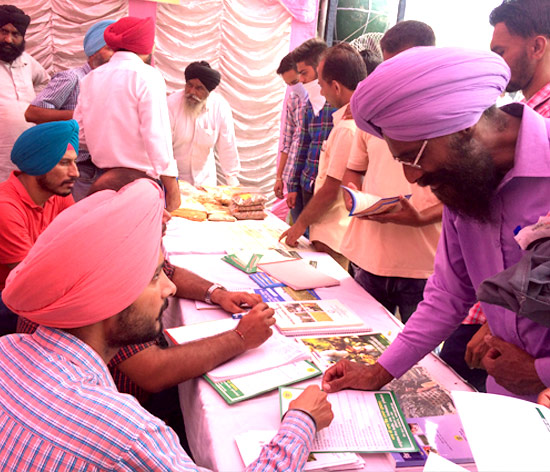
Berseem or Egyptian clover (trifolium alexandrinum) is a nutritive, succulent, palatable and digestive winter fodder, also known as the ‘king of fodders’, especially in areas where irrigation water is available in plenty. The roots of this plant consist of nodules which increase aeration in the soil. Thus cultivating berseem not only gives a preferable fodder, but also improves the physical properties of the soil, which results in higher yields from the next crop grown on the same piece of land.
Gurdaspur district of Punjab has a total area of 13,215 hectares under berseem. In the Basmati-Based Cropping System project under the Reviving the Green Revolution (RGR) initiative of the Trusts, the farmers requested guidance on growing berseem seeds of improved varieties with higher yields. One cluster was selected for testing purposes where seeds of two improved varieties — BL-1 and BL-10 — were given to farmers in five villages. A comparative check was kept against the local variety and the farmers were given necessary advisory on best practices to raise the crop. The improved variety gave five cuttings and produced 80-100 quintals per cutting. Now fodder yields have reached 400-500 quintals per acre.
Looking at the benefits of the varietal trials under the guidance of the RGR Cell, Palwinder Singh of Khokhar Rajputana village explored the potential of increasing seed production of berseem as the availability of the improved varieties was limited in his area. The team from the RGR Cell advised him to bring in experts from the Krishi Vigyan Kendra, Punjab Agricultural University and Department of Agriculture. The team also encouraged other farmers, along with Palwinder, to consider seed production.
To provide market linkage and long term sustainability to berseem growers, the RGR Cell has linked more than 50 farmers with the Maharaj Ranjit Singh Agriculture Producer Company in Hoshiarpur.The company’s members are now producing seeds for MilkFed, Verka and India Seed Company under a buyback arrangement. Says an earnest member, “The scope of seed production can be seen from the fact that our group produced nearly 90 tonnes of seeds of both varieties on around 300 acres of land during 2016-17. We had never imagined that we would be able to make a net profit of `1.5 crore”. Owing to these notable results, Khokhar Rajputana is now emerging as a potential ‘seed cluster’ for berseem.
This story has been taken from the Sir Ratan Tata Trust and Allied Trusts Annual Report 2016-17.
